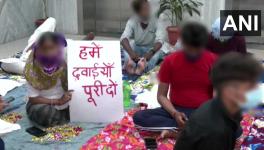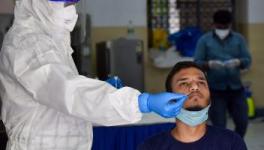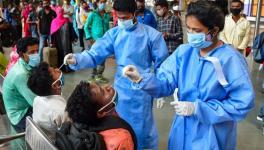Shortage of Life-Saving Drugs Leaves HIV Patients in Lurch

Representational Image. Image Courtesy: EastMojo
Hailed by some doctors as a ‘miracle drug’, Dolutegravir arrived as a ray of hope for thousands of Human Immunodeficiency Virus (HIV) patients after its introduction in India in 2020.
Subsequently, patients with HIV, the virus which causes Acquired Immunodeficiency Syndrome (AIDS), switched to the antiretroviral therapy (ART) drug, which helped in boosting the growth of immune cells and reducing the viral load.
However, a countrywide shortage of Dolutegravir has left patients in the lurch. In 2020, Nitin Solanki (name changed) started taking Dolutegravir and felt the benefits immediately. But the situation changed in the last two months with Solanki unable to take a single tablet. He has been visiting the local antiretroviral centre in Thane, Maharashtra, only to return empty-handed due to no stock of Dolutegravir, Scroll reported.
“I have started fighting with officials to get us the drug. When the government campaigned for HIV and asked people to get tested, they promised to provide us with treatment. Where is that commitment?” Solanki, who is jobless and dependent on medicines disbursed at ART centres free of cost, asked. These
treatment centres normally obtain their supplies from the National AIDS Control Organisation (NACO), which has passed the buck to state governments.
Similarly, Tamil Nadu is short of antiretroviral drugs, like Tenofovir Disoproxil, Lamivudine, Dolutegravir, Abacavir and Lopinavir, official sources in the state health department confirmed to The Hindu.
ART centres are disbursing drugs for only 15 days instead of the mandatory one to three months. “As per national guidelines, each ART centre should maintain the stock necessary for three months. There is a shortage of Abacavir and Lopinavir,” an official source told The Hindu.
Recently, an elderly woman who was on ART for several years said that an ART centre in Chennai disbursed medicines only for a week and asked her to return for a refill. “When I asked why they were issuing drugs for such a short duration, they told me there was no stock. The next time, my refill was for a week again and later for 15 days. I have a job, and it is difficult to make frequent visits for refills,” she said.
In Manipur, nearly 13,000 HIV/AIDS patients are in a precarious situation with the State AIDS Control Society (SACS) unable to procure the crucial drugs from NACO and maintain the usual six-month buffer stock, News18 reported. NACO has shifted the responsibility of procuring the drugs to SACS from this financial year.
Representatives of NGOs Manipur Network for Positive People (MNP +), CARE Foundation, Social Awareness Service Organisation and Kripa Society were the first to draw attention to the severe shortage of ART drugs. “This present situation has drastically affected more than 13,000 ART patients in the state and compromised the adherence aspect of ART consumers,” MNP + president L Deepak told the media.
“If the concerned authority fails to heed the calls without taking immediate steps or making arrangements, the lives of more 13,000 people will be jeopardised,” Care Foundation, Imphal, secretary Jotin Thangjam said.
The acute shortage of drugs has pushed ART centres either to put patients on different drug regimens or to ask them to purchase drugs by themselves and get the expenses reimbursed at the centres.
Antiretroviral drugs are procured by NACO and supplied for free through antiretroviral centres. These drugs are obtained through the Central Medicine Services Society, a government agency that handles bulk purchasing for the ministry of health.
The shortage of supply forced NACO to ask states to procure drugs on their own twice in the last six months. According to a senior NACO official, the delay could last several weeks or even months due to multiple “technical hurdles” in the procurement process, Scroll reported.
Nalinikanta Rajkumar, president, Manipur’s Community Network for Empowerment, which helps drug users through de-addiction and treatment, said that since NACO began antiretroviral services in 2004, the procurement process should have been streamlined by now. “If the government can’t handle such an old programme, it shows their lack of interest in helping HIV patients,” he told Scroll.
The writer is an intern with Newsclick.
Get the latest reports & analysis with people's perspective on Protests, movements & deep analytical videos, discussions of the current affairs in your Telegram app. Subscribe to NewsClick's Telegram channel & get Real-Time updates on stories, as they get published on our website.
























